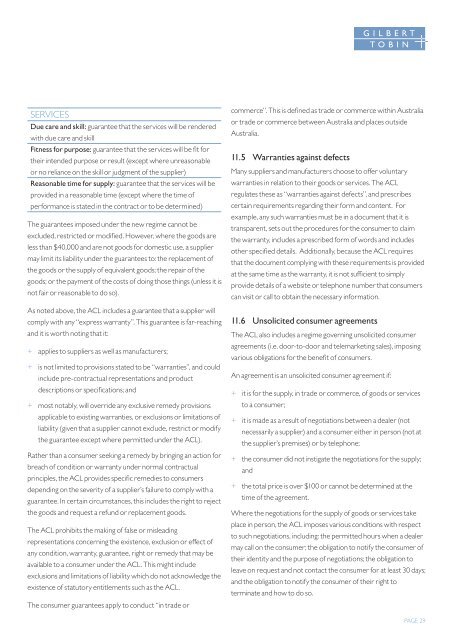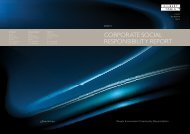Gilbert + tobin - Gilbert and Tobin
Gilbert + tobin - Gilbert and Tobin
Gilbert + tobin - Gilbert and Tobin
You also want an ePaper? Increase the reach of your titles
YUMPU automatically turns print PDFs into web optimized ePapers that Google loves.
Services<br />
Due care <strong>and</strong> skill: guarantee that the services will be rendered<br />
with due care <strong>and</strong> skill<br />
Fitness for purpose: guarantee that the services will be fit for<br />
their intended purpose or result (except where unreasonable<br />
or no reliance on the skill or judgment of the supplier)<br />
Reasonable time for supply: guarantee that the services will be<br />
provided in a reasonable time (except where the time of<br />
performance is stated in the contract or to be determined)<br />
The guarantees imposed under the new regime cannot be<br />
excluded, restricted or modified. However, where the goods are<br />
less than $40,000 <strong>and</strong> are not goods for domestic use, a supplier<br />
may limit its liability under the guarantees to: the replacement of<br />
the goods or the supply of equivalent goods; the repair of the<br />
goods; or the payment of the costs of doing those things (unless it is<br />
not fair or reasonable to do so).<br />
As noted above, the ACL includes a guarantee that a supplier will<br />
comply with any “express warranty”. This guarantee is far-reaching<br />
<strong>and</strong> it is worth noting that it:<br />
+ + applies to suppliers as well as manufacturers;<br />
+ + is not limited to provisions stated to be “warranties”, <strong>and</strong> could<br />
include pre-contractual representations <strong>and</strong> product<br />
descriptions or specifications; <strong>and</strong><br />
+ + most notably, will override any exclusive remedy provisions<br />
applicable to existing warranties, or exclusions or limitations of<br />
liability (given that a supplier cannot exclude, restrict or modify<br />
the guarantee except where permitted under the ACL).<br />
Rather than a consumer seeking a remedy by bringing an action for<br />
breach of condition or warranty under normal contractual<br />
principles, the ACL provides specific remedies to consumers<br />
depending on the severity of a supplier’s failure to comply with a<br />
guarantee. In certain circumstances, this includes the right to reject<br />
the goods <strong>and</strong> request a refund or replacement goods.<br />
The ACL prohibits the making of false or misleading<br />
representations concerning the existence, exclusion or effect of<br />
any condition, warranty, guarantee, right or remedy that may be<br />
available to a consumer under the ACL. This might include<br />
exclusions <strong>and</strong> limitations of liability which do not acknowledge the<br />
existence of statutory entitlements such as the ACL.<br />
The consumer guarantees apply to conduct “in trade or<br />
commerce”. This is defined as trade or commerce within Australia<br />
or trade or commerce between Australia <strong>and</strong> places outside<br />
Australia.<br />
11.5 Warranties against defects<br />
Many suppliers <strong>and</strong> manufacturers choose to offer voluntary<br />
warranties in relation to their goods or services. The ACL<br />
regulates these as “warranties against defects”, <strong>and</strong> prescribes<br />
certain requirements regarding their form <strong>and</strong> content. For<br />
example, any such warranties must be in a document that it is<br />
transparent, sets out the procedures for the consumer to claim<br />
the warranty, includes a prescribed form of words <strong>and</strong> includes<br />
other specified details. Additionally, because the ACL requires<br />
that the document complying with these requirements is provided<br />
at the same time as the warranty, it is not sufficient to simply<br />
provide details of a website or telephone number that consumers<br />
can visit or call to obtain the necessary information.<br />
11.6 Unsolicited consumer agreements<br />
The ACL also includes a regime governing unsolicited consumer<br />
agreements (i.e. door-to-door <strong>and</strong> telemarketing sales), imposing<br />
various obligations for the benefit of consumers.<br />
An agreement is an unsolicited consumer agreement if:<br />
+ + it is for the supply, in trade or commerce, of goods or services<br />
to a consumer;<br />
+ + it is made as a result of negotiations between a dealer (not<br />
necessarily a supplier) <strong>and</strong> a consumer either in person (not at<br />
the supplier’s premises) or by telephone;<br />
+ + the consumer did not instigate the negotiations for the supply;<br />
<strong>and</strong><br />
+ + the total price is over $100 or cannot be determined at the<br />
time of the agreement.<br />
Where the negotiations for the supply of goods or services take<br />
place in person, the ACL imposes various conditions with respect<br />
to such negotiations, including: the permitted hours when a dealer<br />
may call on the consumer; the obligation to notify the consumer of<br />
their identity <strong>and</strong> the purpose of negotiations; the obligation to<br />
leave on request <strong>and</strong> not contact the consumer for at least 30 days;<br />
<strong>and</strong> the obligation to notify the consumer of their right to<br />
terminate <strong>and</strong> how to do so.<br />
PAGE 29







